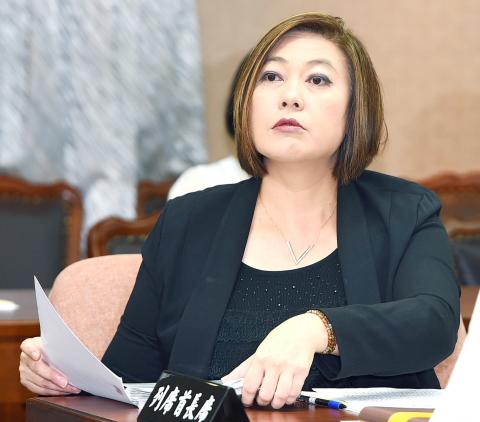Much-anticipated draft amendments to the three main media laws could be announced next month or in November, the National Communications Commission (NCC) said yesterday, adding that they would address problems caused by rules barring the government, political parties and the military from investing in media outlets.
NCC Chairperson Nicole Chan (詹婷怡) told a question-and-answer session at the Legislative Yuan in Taipei that the regulations barring investments from political parties, the government and the military are difficult to enforce.
The commission established a taskforce to review the three laws — the Radio and Television Act (廣播電視法), Satellite Broadcasting Act (衛星廣播電視法) and Cable Radio and Television Act (有線廣播電視法), she said.

Photo: Liao Chen-huei, Taipei Times
The commission is considering allowing investments by the three, but their shareholdings would likely be capped at a certain percentage, and neither politicians nor government or military officials would be allowed to control media companies, she said.
Commission members and lawmakers on the legislature’s Transportation Committee had previously deliberated over the exact percentage, ranging from 5 to 10 percent, Chan said.
Democratic Progressive Party (DPP) legislators Cheng Pao-ching (鄭寶清) and Lin Chun-hsien (林俊憲) and People First Party Legislator Lee Hung-chun (李鴻鈞) yesterday urged the commission to quickly amend the regulations.
Cheng and Lin mentioned the dispute in July involving Chunghwa Telecom’s Multimedia-on-Demand system.
The telecom, in which the government holds a 38.43 percent stake, is banned from owning channels that provide content, Cheng said.
When it tried to change the mechanism for dividing the content authorization fee among different channels, some channel operators opposed the move, which led to the disputes, but this could have been avoided if it were allowed to become a content provider and to own channels, he said.
Taiwan Optical Platform’s proposed acquisition of Eastern TV failed after its competitor asked a politician to buy just one Taiwan Optical Platform share, he said.
Another example was Momo Kids TV’s license renewal case, which received conditional approval to on Wednesday after the channel was told to divest itself — within three years — of the 15 percent of shares that are indirectly owned by the Taipei City Government and Labor Pension Fund, he said.
Cheng proposed that political parties, the government or the military be allowed to invest in media outlets as “special shareholders,” but be barred from controlling the companies or holding seats on their boards.
Lee said that media outlets cannot produce quality programs without sufficient advertising revenue, so discussions about amending the three laws should not be focused on limiting the market share or ownership rules.
“The purpose of ban [on the three sectors’ investing] was to avoid having media outlets used to champion the agendas of certain political parties. Yet when you look at cable news channels now, which of them can honestly say they do not represent the values of a certain political camp?” Lee said. “At present, news channels are only interested in producing content targeting their niche markets to ensure steady advertising revenue.”

Taiwan has received more than US$70 million in royalties as of the end of last year from developing the F-16V jet as countries worldwide purchase or upgrade to this popular model, government and military officials said on Saturday. Taiwan funded the development of the F-16V jet and ended up the sole investor as other countries withdrew from the program. Now the F-16V is increasingly popular and countries must pay Taiwan a percentage in royalties when they purchase new F-16V aircraft or upgrade older F-16 models. The next five years are expected to be the peak for these royalties, with Taiwan potentially earning

STAY IN YOUR LANE: As the US and Israel attack Iran, the ministry has warned China not to overstep by including Taiwanese citizens in its evacuation orders The Ministry of Foreign Affairs (MOFA) yesterday rebuked a statement by China’s embassy in Israel that it would evacuate Taiwanese holders of Chinese travel documents from Israel amid the latter’s escalating conflict with Iran. Tensions have risen across the Middle East in the wake of US and Israeli airstrikes on Iran beginning Saturday. China subsequently issued an evacuation notice for its citizens. In a news release, the Chinese embassy in Israel said holders of “Taiwan compatriot permits (台胞證)” issued to Taiwanese nationals by Chinese authorities for travel to China — could register for evacuation to Egypt. In Taipei, the ministry yesterday said Taiwan

Taiwan is awaiting official notification from the US regarding the status of the Agreement on Reciprocal Trade (ART) after the US Supreme Court ruled US President Donald Trump's global tariffs unconstitutional. Speaking to reporters before a legislative hearing today, Premier Cho Jung-tai (卓榮泰) said that Taiwan's negotiation team remains focused on ensuring that the bilateral trade deal remains intact despite the legal challenge to Trump's tariff policy. "The US has pledged to notify its trade partners once the subsequent administrative and legal processes are finalized, and that certainly includes Taiwan," Cho said when asked about opposition parties’ doubts that the ART was

If China chose to invade Taiwan tomorrow, it would only have to sever three undersea fiber-optic cable clusters to cause a data blackout, Jason Hsu (許毓仁), a senior fellow at the Hudson Institute and former Chinese Nationalist Party (KMT) legislator, told a US security panel yesterday. In a Taiwan contingency, cable disruption would be one of the earliest preinvasion actions and the signal that escalation had begun, he said, adding that Taiwan’s current cable repair capabilities are insufficient. The US-China Economic and Security Review Commission (USCC) yesterday held a hearing on US-China Competition Under the Sea, with Hsu speaking on